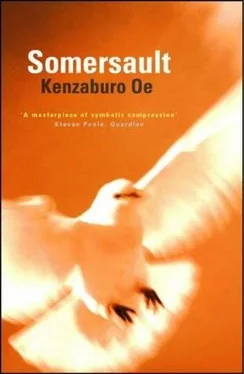In the evening, uncertain about when Ikuo was to return, Kizu went ahead and began preparing a stew. As he'd learned to do in America, he'd bought various cuts of beef and frozen the unused portions. Now, to use these leftovers, he cut them up and put them in a pot with water, celery, carrots, and onions-leftover vegetables from the bottom shelf of his refrigerator. The stew was just beginning to bubble when Kizu tasted it and decided that, all things considered, it could do with a pinch more salt. His chipper feelings from talking with Dancer were still with him as he tapped the plastic salt shaker smartly against the cutting board to loosen the lumps of salt inside. The salt shaker, it turned out, wasn't plastic but glass, and it shattered, a shard of glass cutting deeply into his right wrist.
The only doctor Kizu could think of was the well-known cancer spe- cialist his institute had introduced him to so, at his wits' end, he called the apartment superintendent, who advised him to go to a hospital in Rop- pongi where Kizu's university had a special arrangement. Kizu rushed off to the hospital in a taxi and, for the first time since his operation for intes- tinal cancer, had stitches taken in his skin. If this were your left wrist, the blunt physician remarked, hoping to be funny, you'd have some explaining to do.
Ikuo was still out when Kizu returned to his apartment. The pain in his wrist bothered him-making him consider the deeper pain that was sure to come from his cancer-so he went about cleaning up the kitchen to take his mind off it. Inside the brass sink there was one large pinkish drop of his blood.
Kizu couldn't shake off thoughts of his cancer, his mind drifting to how fragile his body was. When you consider the eternal soul, though, he thought, which links humanity's past, present, and future, the fragility of the body is of little consequence. Instead, it should be a sign pointing the way for people to overcome the individual ego. The eternal soul, connect- ing the far-off Stone Age with some perhaps purgatorylike future Electronic Age. But did he have faith in the soul? The closest thing to faith he had, he decided, with a sinking feeling, were the thoughts that arise from these very emotions.
In the end he gave up on the stew, making do with a can of Campbell's tomato soup and some large crackers that he ate in the living room. The illustrated poetry collection and the research books he'd shown Dancer were still on top of the small table. He picked up the book with the essay compar- ing Thomas and Kierkegaard, and flipped through an essay by a woman scholar on the poetry collection.
In a pedantic tone the woman noted that the word ingrowing was a key term for Thomas, that he was well aware that if one thought too long about something, there was the danger of one's thoughts becoming too narrow and closed in. As Yeats puts it, she wrote, "Things thought too long can be no longer thought, for beauty dies of beauty, worth of worth."
Thomas, then, wrote the poems that accompany the paintings in order to rescue himself from his own narrow way of thinking as a poet. At this point the author embarked on her main theme, an analysis of Thomas's poem on the famous René Magritte painting showing a boot changing, at the tip, into a human foot.
Kizu returned to his own closed-in, ingrown nail-parings. In the kitchen, too, this thought had arisen in his mind-a mental image of Tokyo hit by some catastrophe, too many dead bodies for anyone to do anything about, a favor only for the crows (this area didn't have any stray dogs)- the leftover bodies rotting, shriveling up, and himself among the dead. In the face of thoughts like these, how can one believe in the eternal soul?
"Well, maybe that's a kind of sign?" Kizu said aloud, as if to make cer- tain that these thoughts were ingrowing within him.
Starting with Dancer's visit, the day had been a busy one for him. And it turned out to be an important day for Patron's new movement. Dancer had dropped by Kizu's apartment on the way back from visiting Guide in the hospital, and when she was still on the way back to the office the news came in that Guide had regained consciousness. Ogi drove Patron over to the hos- pital right away, with Ikuo driving the minivan, Dancer aboard, close on their heels. This time they were all able to see Guide. In the evening, Patron wanted to discuss something with Kizu, so Ikuo called the apartment several times, but there was no reply. Kizu was out getting his injured wrist treated. When Ikuo returned to the apartment late that night, Kizu was still up, so they headed off to the office once again.
Kizu and Ikuo both knew very little about Guide's condition, so there wasn't much to talk about as they drove. When they arrived at Seijo, they learned that Ogi had stayed behind in the hospital waiting room on Guide's floor in case there were any changes. Dancer led Kizu inside. Patron was crouched down, head hanging on his chest, in the low armchair beside his bed. But as soon as Kizu sat down across from him, he looked up and a tor- rent of words gushed forth.
"Professor, Guide has regained consciousness! I don't know how his re- habilitation will go, but I know he'll be all right. He was asleep when I went into his room, but he opened his eyes right away and looked at me. He didn't say anything, which is understandable, seeing as how he'd only been conscious for two hours. But I saw in his eyes exactly what you talked about. I saw him quietly emerge.
"Guide closed his eyes after this, but I could tell he wasn't asleep since he blinked over and over. I stood beside his bed and couldn't contain my ex- citement. And I remembered some lines of poetry you had talked with me about, not Thomas's poetry but a Greek poem translated by E. M. Forster that Thomas apparently loved. You'll have to remind me of the exact wording."
"That was Pindar's ode: Man is the dream of a shadow, But when the god-given brightness comes A bright light is among men, and an age that is gentle comes to birth."
"Thank you, that's it exactly," Patron said, his eyelids swelling red- dish, his eyes turning tearful. "In our last lecture I think I spoke a bit too openly and hurt your feelings, and I apologize. The reason I've asked you over tonight is for you to lecture one more time on Thomas. With Guide recovering now, our movement will regain momentum. This is all well and good, but I might get too caught up in things to have time for any more poetry lectures. So tonight I was hoping you could read one of his more deeply contemplative poems."
Kizu complied right away. He picked from his notes one that he had already translated.
Grey waters, vast as an area of prayer that one enters. Daily over a period of years I have let the eye rest on them.
Was I waiting for something?
Nothing but that continuous waving that is without meaning occurred.
Ah, but a rare bird is rare. It is when one is not looking, at times one is not there that it comes.
You must wear your eyes out, as others their knees.
I became the hermit of the rocks, habited with the wind and the mist. There were days, so beautiful the emptiness it might have filled, its absence was as its presence; not to be told any more, so single my mind after its long fast, my watching from praying.
Kizu first read the original poem and then his translation, and after- ward Patron turned his eyes-no longer the tearful eyes of a child, but soft, the edges of the eyelids red-toward Kizu and spoke in a calm voice.
"How wonderful it would be if Guide continues to recover, his reha- bilitation goes well, and we could be like the hermit of the rock^s. But now that he's awakened, I don't imagine he'll want to live that way. Our tranquil days are over."
5: THE MOOSBRUGGER COMMITTEE
Читать дальше





